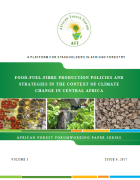The Congo Basin (CB) forest is highly rich in biodiversity and contain mineral deposits of economic importance. The forest is under threat as a result of human activities including: agriculture (slash and burn and agro-industry plantations), mining, logging, infrastructural development, fuelwood extraction. Underlying factors that pose threat to the forest cover include: demographic pressure, political instability, weak governance and institutional arrangements and the quest for economic growth. The forest cover has witnessed a change over the last three decades. The deforestation rate for the CB forest between 1990 and 2000 was estimated at 0.09% while the forest degradation rate for the same period was estimated at 0.05%. Between 2000 and 2005, the deforestation and forest degradation rates of the region was estimated at 0.17% and 0.09% respectively. Of the CB countries, the Democratic Republic of Congo (DRC) has the highest rate of deforestation and forest degradation while Equatorial Guinea emerged as the country with the least deforestation rate.

